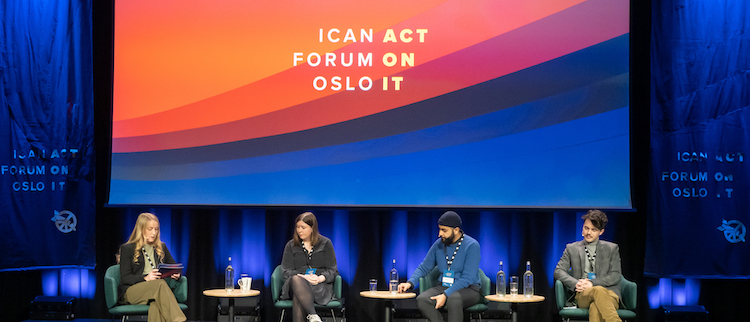By Jamshed Baruah
GENEVA, 12 March 2023 (IDN) — European parliamentarians have emphasized the need for taking “concrete steps” towards nuclear disarmament so that it becomes “a priority for the year 2023”. This, they said, should be “complementary to stigmatising nuclear weapons and strengthening disarmament treaties such as the TPNW“, the United Nations Treaty on the Prohibition of Nuclear Weapons., which entered into force on 22 January 2021.
Eighteen parliamentarians from nine European countries—Belgium, Denmark, Germany, Iceland, Norway, Scotland, Slovenia and Sweden—joined a conference on the occasion of the ICAN Act on It Forum on 9 and 10 March in Oslo, Norway, which underscored the crucial role of parliamentarians in advancing nuclear disarmament.
The conference co-hosts were the Norwegian Christian-Democratic Party, the Norwegian Liberal Party and the Socialist Left Party.
In a summary statement, the parliamentarians call on their “governments to reduce the role of nuclear weapons in their security strategies, to continuously condemn nuclear threats and to encourage our allied partners in the G7 to make the 2023 G7 summit (in May) in the symbolic city of Hiroshima the starting point for nuclear disarmament negotiations”.
The parliamentarians’ summary statement further explains that they had met to discuss promoting nuclear disarmament and the TPNW and their role as parliamentarians in “achieving a world without nuclear weapons”. They explored their national situations and positions and exchanged ideas on encouraging bolder and more concrete actions towards nuclear disarmament.
The summary statement further pointed out that ten years after, Norway hosted the first conference on the humanitarian impact of nuclear weapons. This treaty bans nuclear weapons under international law with 92 signatories and 68 state parties.
“The TPNW is an important reinforcement of the nuclear disarmament and nonproliferation regime in a time of heightened risks of nuclear use and the erosion of the nuclear taboo. The illegal and brutal war of aggression on Ukraine inflicted by the Russian regime’s nuclear threats exposes the unbearable risks associated with nuclear weapons. We unequivocally condemn any and all nuclear threats and urge leaders and politicians to ensure that nuclear weapons will never be used again through complete global nuclear disarmament.”
The parliamentarians’ conference discussed the lack of transparency in nuclear policies, including on nuclear sharing arrangements. Complementary to the NPT, the TPNW is the most comprehensive legal tool for achieving this goal, they noted. And therefore, called upon all governments to promote the universalization of the Treaty and support its implementation and join the TPNW as soon as possible.
They welcomed the entry into force of the TPNW and the successful first meeting of state parties in June 2022. At this meeting, state parties set out an ambitious plan to strengthen the disarmament regime, complementing their efforts as parties of the Treaty on the Non-Proliferation of Nuclear Weapons (NPT).
As the only treaty to prohibit the threat of using nuclear weapons, and through the States Parties’ strong condemnation of any and all nuclear threats, the TPNW has set an example for the international community on how to strengthen the decades-old taboo through continuous and consistent condemnation of nuclear threats, the parliamentarians declared.
They praised the constructive engagement of states that have participated as observers in the meeting of state parties to the TPNW. They encouraged all other non-signatories to observe the second meeting as an intermediate step towards the signature and ratification of the TPNW.
“We urge our governments to explore options to collaborate with states parties, particularly in the area of victim assistance and environmental remediation, as set out in Article 6 and Article 7 of the TPNW.”
At the ICAN Act on It Forum in Oslo, experts, campaigners and friends from all around the world came together for two days to learn and exchange more about the arguments and tools that can be used to advocate for nuclear disarmament and the UN Treaty on the Prohibition of Nuclear Weapons in nuclear-weapons-complicit states.
Nuclear-weapon-complicit states may not have their own nuclear weapons. Still, they are enablers of the status quo by pretending to favour nuclear disarmament while also actively supporting nuclear weapons in their national security policies. They are doing little to support the disarmament movement.
Five countries—Belgium, Germany, Italy, the Netherlands and Turkey—all host US nuclear weapons. In addition, 29 countries (plus the five hosts) also “endorse” the possession and use of nuclear weapons by allowing the potential use of nuclear weapons on their behalf as part of defence alliances, including the North Atlantic Treaty Organisation (NATO) and the Collective Security Treaty Organisation (CSTO).
All thirty-four countries (nuclear-complicity-weapon states) that endorse nuclear weapon usage are Albania, Armenia, Australia, Belarus, Belgium, Bulgaria, Canada, Croatia, Czech, Denmark, Estonia, Finland, Germany, Greece, Hungary, Iceland, Italy, Japan, Latvia, Lithuania, Luxembourg, Montenegro, The Netherlands, North Macedonia, Norway, Poland, Portugal, Romania, Slovakia, Slovenia, South Korea, Spain, Sweden and Turkey.
Against this grim backdrop, representatives of States, cities and civil society, parliamentarians, survivors and other experts and campaigners discussed at the Forum organized by the Nobel Peace Prize Laureate 2017, International Campaign to Abolish Nuclear Weapons, ways and means of moving nuclear-complicity-states away from their antiquated and alarming stances.
They did so in the conviction that nuclear weapons are the most destructive, inhumane, and indiscriminate weapons ever created for which there is no humanitarian response. “The unacceptable risk demands that we take action,” they declared. [IDN-InDepthNews]
Image: ‘ICAN Act on It Forum’ in Oslo. Credit: ICAN
IDN is the flagship agency of the Non-profit International Press Syndicate.
Visit us on Facebook and Twitter.
We believe in the free flow of information. Republish our articles for free, online or in print, under Creative Commons Attribution 4.0 International, except for articles that are republished with permission.

